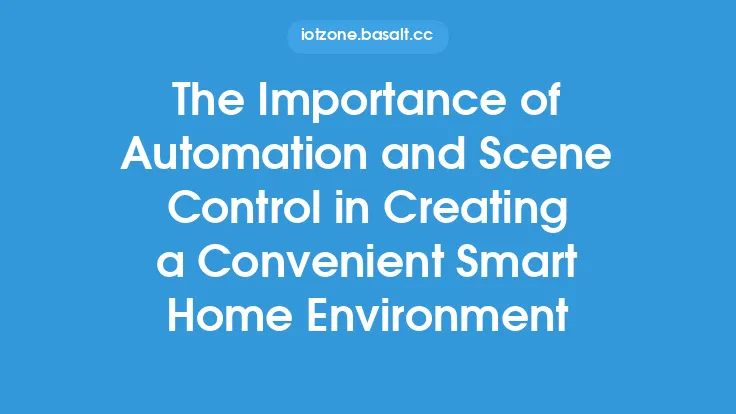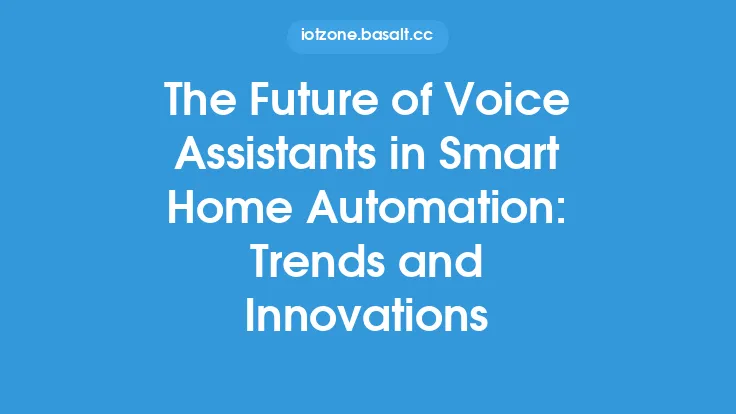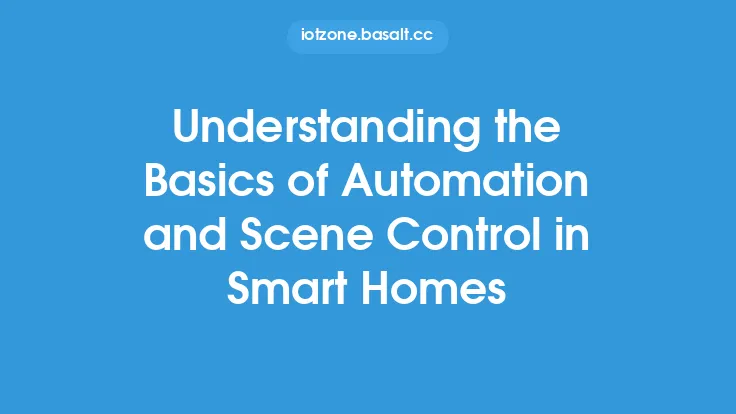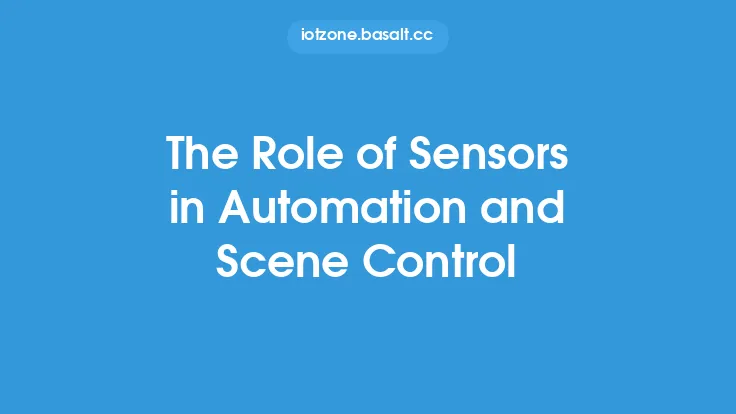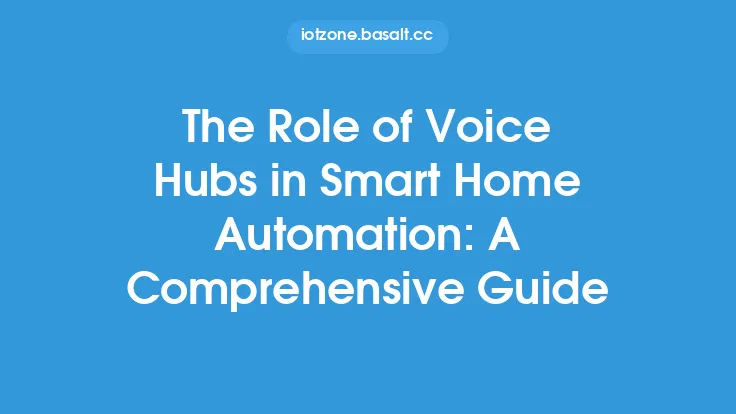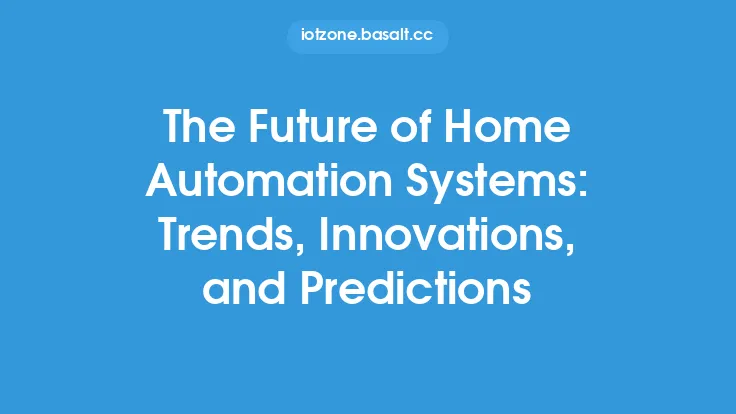The concept of smart home automation has been rapidly evolving over the years, with significant advancements in scene control technology being a key driver of this growth. Scene control refers to the ability to control and automate multiple devices and systems within a smart home, creating customized scenes or environments that cater to specific needs and preferences. This technology has the potential to revolutionize the way we interact with our living spaces, making our homes more comfortable, convenient, and energy-efficient.
Introduction to Scene Control Technology
Scene control technology is based on the idea of creating predefined scenarios or scenes that can be triggered by a single command or action. These scenes can be customized to control various aspects of a smart home, including lighting, temperature, entertainment, and security systems. For instance, a "goodnight" scene might turn off all the lights, lock the doors, and adjust the thermostat to a comfortable sleeping temperature. Scene control technology uses a combination of hardware and software components, including sensors, actuators, and control systems, to create and manage these customized scenes.
Advancements in Scene Control Technology
Recent advancements in scene control technology have focused on improving the user experience, increasing flexibility, and enhancing integration with other smart home systems. One significant development is the use of artificial intelligence (AI) and machine learning (ML) algorithms to create more sophisticated and adaptive scene control systems. These algorithms can learn a user's preferences and habits over time, allowing the system to make predictions and adjustments to create a more personalized experience. For example, an AI-powered scene control system might automatically adjust the lighting and temperature in a room based on the time of day, the user's schedule, and their preferred settings.
Role of IoT Devices in Scene Control
The Internet of Things (IoT) has played a crucial role in the development of scene control technology, enabling the integration of various devices and systems within a smart home. IoT devices, such as smart bulbs, thermostats, and security cameras, can be connected to a central hub or control system, allowing for seamless communication and control. This has enabled the creation of more complex and customized scenes, as well as the ability to control and monitor devices remotely using a smartphone or tablet. The use of IoT devices has also enabled the development of more advanced scene control features, such as voice control and gesture recognition.
Technical Aspects of Scene Control
From a technical perspective, scene control technology relies on a range of protocols and standards to enable communication between devices and systems. These include protocols such as Zigbee, Z-Wave, and Bluetooth, which allow devices to communicate with each other and with a central hub or control system. Scene control systems also use a range of software platforms and programming languages, such as Python and Java, to create and manage customized scenes. The use of APIs (Application Programming Interfaces) and SDKs (Software Development Kits) has also enabled developers to create custom integrations and applications for scene control systems.
Benefits of Advanced Scene Control Technology
The benefits of advanced scene control technology are numerous, ranging from increased convenience and comfort to energy efficiency and cost savings. By creating customized scenes, users can automate routine tasks and reduce the need for manual intervention, making their lives easier and more convenient. Advanced scene control technology can also help to reduce energy consumption by optimizing lighting, heating, and cooling systems, and by detecting and responding to occupancy and activity patterns. Additionally, scene control technology can enhance home security by integrating with security systems and cameras, providing users with greater peace of mind and control over their living environment.
Future Developments and Trends
As scene control technology continues to evolve, we can expect to see a range of new developments and trends emerge. One area of focus will be the integration of scene control with other smart home systems, such as voice assistants and home entertainment systems. The use of AI and ML algorithms will also continue to play a key role in the development of more sophisticated and adaptive scene control systems. Additionally, the increasing adoption of IoT devices and the growth of the smart home market will drive demand for more advanced and user-friendly scene control solutions. As the technology continues to advance, we can expect to see more seamless and intuitive interactions between users and their smart home environments, creating a more comfortable, convenient, and enjoyable living experience.
Challenges and Limitations
Despite the many benefits and advancements in scene control technology, there are still several challenges and limitations that need to be addressed. One of the main challenges is the complexity and fragmentation of the smart home market, with multiple protocols and standards making it difficult to achieve seamless integration between devices and systems. Additionally, the use of AI and ML algorithms raises concerns about data privacy and security, as well as the potential for bias and errors in decision-making. Furthermore, the cost and accessibility of advanced scene control technology can be a barrier for some users, particularly those with limited technical expertise or budget constraints.
Conclusion
In conclusion, the future of smart home automation is closely tied to the development of advanced scene control technology. As the technology continues to evolve, we can expect to see more sophisticated and user-friendly solutions that enhance the comfort, convenience, and energy efficiency of our living environments. While there are still challenges and limitations to be addressed, the benefits of scene control technology make it an exciting and rapidly growing field, with significant potential for innovation and growth in the years to come. As the smart home market continues to expand and mature, we can expect to see scene control technology play an increasingly important role in shaping the future of home automation and control.
